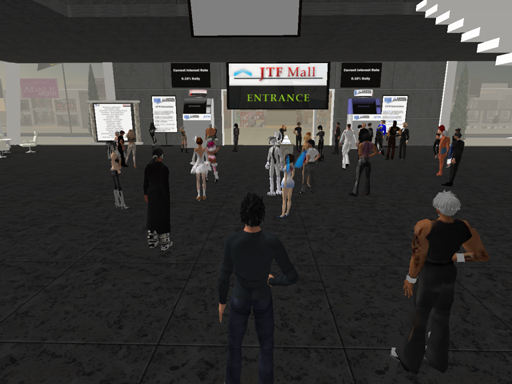Water cooler discussions * topics revisited * latest crisis * out-of-hand dismissal * communist parallel * obscured blessings * ah, but-
If you are ever in any doubt that Second Life users
(or, at least, the vocal ones) are a community, check out the topics of conversation. There are minor topics, discussed by individual posters and commenters; and then there are the big topics - the ones where you find yourself discussing them in-world, on blogs and in blog comments. A common perception of reality is, of course, one of the characteristics of a community. But even more fascinating is the
persistence and
pervasiveness of topics and conversations; it's not unusual to start a conversation with an avatar in-world, continue it over several blog posts and comments and end it on twitter - all the while interacting and including others in conversation.
The topics of late have ranged from banking in virtual worlds to meaning and methods of using virtual worlds. I don't know why
"The end is nigh!" debates are always followed by the more philosophical ones, but it's nice in an "
After every rain comes the sun" kinda way.
So, after the extremely philosophical "
what is the meaning of IS" debates of late have subsided, I was waiting for the bombshell to drop - and it has. Linden Lab has decided to tighten the TM reigns on the old SL mare and prod us in a new direction, and the SLogosphere
exploded.
First, quickly on the topic of trademarks: Can LL tighten TM control?
Yes. Will it in fact have any impact on most bloggers?
No. Is it a sign of an upcoming IPO?
Don't be silly - LL would be crazy to IPO with stagnating growth, in a recession-bound market, and with a missing/unproved CEO. Is it yet another perhaps needed, but extremely stupidly implemented decision which seemingly affects the whole Second Life community?
Absolutely - but I have come to expect nothing less of Linden Lab. Should we panic? Well,
if you insist.
But back to the community. I grew up in a
communist country and once heard this anecdote by
one of the commie leaders: he was meeting with some Italian representatives who commented that our delegation (and, indeed, the constituent nations) bickered all the time. "
Ah, yes, that is very true," answered our leader, "
but just try attacking us - we'll close like a fist and repel you!". "
But," wondered the Italian delegate, "
what will you do if nobody attacks you?"
As the former country is now fragmented into seven new countries
(I believe, and at last count; but it's so hard to keep track), the Italian guy was right. And - doesn't the same hold for the Second Life community? When there are no perceived external dangers, we're at each other's throat over silly things like who is more "
immersed" in the environment and whose prim hair looks better. But, when a threat appears, we form tight ranks and start waving the pitchforks.
With that in mind, Linden Lab's heavy handed policy changes might be seen as a blessing in disguise. A chance blessing, to be sure - I have yet to be impressed with Linden Lab's community handling and no one can pretend
that well - but a blessing none the less.
But, as our example proved, this can only work for so long. Sooner or later, you have to move to better community strategies - and I hope Linden Lab find them soon. If only to stop the drama..























